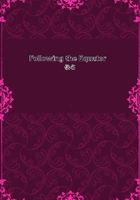
第123章
"I went back to Mrs. Blank, and she was excited, too--oh, all alive. She said:
"'He spoke to you!--didn't he?'
"'Yes, it is what happened.'
"'I knew it! I couldn't hear what he said, but I knew be spoke to you! Do you know who it was? It was Lord C., and he is Master of the Buckhounds!
Tell me--what do you think of him?'
"'Him? Well, for sizing-up a stranger, he's got the most sudden and accurate judgment of any man I ever saw.'
"It pleased her. I thought it would."
G. got away from Nauheim just in time to escape being shut in by the quarantine-bars on the frontiers; and so did we, for we left the next day. But G. had a great deal of trouble in getting by the Italian custom-house, and we should have fared likewise but for the thoughtfulness of our consul-general in Frankfort. He introduced me to the Italian consul-general, and I brought away from that consulate a letter which made our way smooth. It was a dozen lines merely commending me in a general way to the courtesies of servants in his Italian Majesty's service, but it was more powerful than it looked. In addition to a raft of ordinary baggage, we had six or eight trunks which were filled exclusively with dutiable stuff--household goods purchased in Frankfort for use in Florence, where we had taken a house. I was going to ship these through by express; but at the last moment an order went throughout Germany forbidding the moving of any parcels by train unless the owner went with them. This was a bad outlook. We must take these things along, and the delay sure to be caused by the examination of them in the custom-house might lose us our train. I imagined all sorts of terrors, and enlarged them steadily as we approached the Italian frontier. We were six in number, clogged with all that baggage, and Iwas courier for the party the most incapable one they ever employed.
We arrived, and pressed with the crowd into the immense custom-house, and the usual worries began; everybody crowding to the counter and begging to have his baggage examined first, and all hands clattering and chattering at once. It seemed to me that I could do nothing; it would be better to give it all up and go away and leave the baggage. I couldn't speak the language; I should never accomplish anything. Just then a tall handsome man in a fine uniform was passing by and I knew he must be the station-master--and that reminded me of my letter. I ran to him and put it into his hands. He took it out of the envelope, and the moment his eye caught the royal coat of arms printed at its top, he took off his cap and made a beautiful bow to me, and said in English:
"Which is your baggage? Please show it to me."I showed him the mountain. Nobody was disturbing it; nobody was interested in it; all the family's attempts to get attention to it had failed--except in the case of one of the trunks containing the dutiable goods. It was just being opened. My officer said:
"There, let that alone! Lock it. Now chalk it. Chalk all of the lot.
Now please come and show the hand-baggage."
He plowed through the waiting crowd, I following, to the counter, and he gave orders again, in his emphatic military way:
"Chalk these. Chalk all of them."
Then he took off his cap and made that beautiful bow again, and went his way. By this time these attentions had attracted the wonder of that acre of passengers, and the whisper had gone around that the royal family were present getting their baggage chalked; and as we passed down in review on our way to the door, I was conscious of a pervading atmosphere of envy which gave me deep satisfaction.
But soon there was an accident. My overcoat pockets were stuffed with German cigars and linen packages of American smoking tobacco, and a porter was following us around with this overcoat on his arm, and gradually getting it upside down. Just as I, in the rear of my family, moved by the sentinels at the door, about three hatfuls of the tobacco tumbled out on the floor. One of the soldiers pounced upon it, gathered it up in his arms, pointed back whence I had come, and marched me ahead of him past that long wall of passengers again--he chattering and exulting like a devil, they smiling in peaceful joy, and I trying to look as if my pride was not hurt, and as if I did not mind being brought to shame before these pleased people who had so lately envied me. But at heart I was cruelly humbled.
When I had been marched two-thirds of the long distance and the misery of it was at the worst, the stately station-master stepped out from somewhere, and the soldier left me and darted after him and overtook him;and I could see by the soldier's excited gestures that be was betraying to him the whole shabby business. The station-master was plainly very angry. He came striding down toward me, and when he was come near he began to pour out a stream of indignant Italian; then suddenly took off his hat and made that beautiful bow and said:
"Oh, it is you! I beg a thousands pardons! This idiot here---" He turned to the exulting soldier and burst out with a flood of white-hot Italian lava, and the next moment he was bowing, and the soldier and I were moving in procession again--he in the lead and ashamed, this time, I with my chin up. And so we marched by the crowd of fascinated passengers, and I went forth to the train with the honors of war. Tobacco and all.